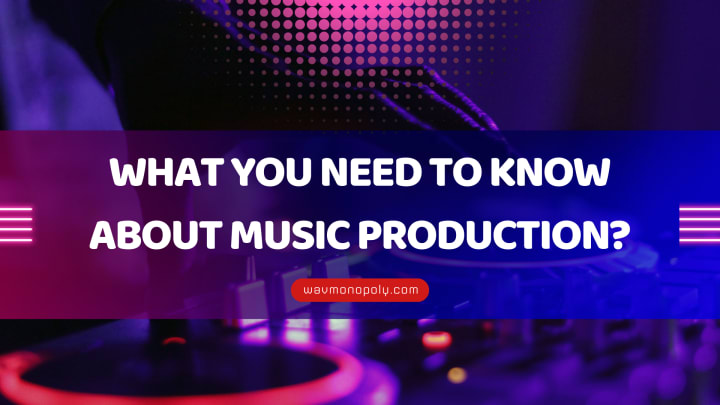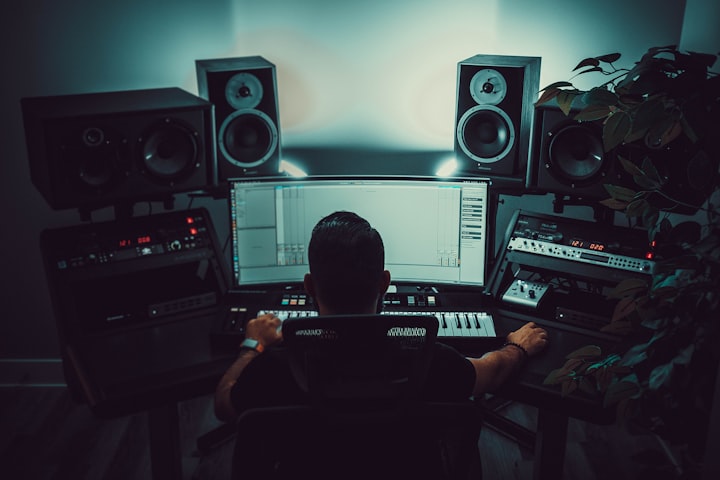What You Need To Know About Music Production?
A Beginner's Guide to Music Production: Understanding the Basics
Music production is the process of creating and producing music. It involves various skills and knowledge, from composition and arrangement to recording and mixing. Whether you are an aspiring musician or a seasoned professional, understanding the fundamentals of music production is crucial for creating high-quality recordings and achieving success in the music industry. In this blog post, we'll discuss what you need to know about music production, including the tools and techniques used by professionals to create music that sounds great.

Understanding Music Theory
Music theory is the foundation of all music production. To create high-quality recordings that sound professional, you need to have a solid understanding of the fundamentals of music theory, including chords, scales, melody, and harmony. This knowledge will help you to create compelling melodies, harmonies, and chord progressions that resonate with your listeners. It will also help you understand how to use different musical elements to convey the emotions and moods you want your music to evoke. Plenty of resources are available online to learn music theory, including YouTube videos, online courses, vocal preset templates, and books. In addition, many digital audio workstations (DAWs) come with built-in music theory tools and functions to help you get started.
Music Production Software
Music production software is a crucial tool for creating high-quality recordings. Many different types of software are available, including digital audio workstations (DAWs), virtual instruments, and plugins. DAWs are the central hub of your music production setup, allowing you to record, edit, and mix your tracks. They typically have various built-in virtual instruments, effects, and mixing tools. Many DAWs also support third-party plugins, which allow you to expand your library of sounds and effects. Additionally, many useful tools and resources are available online, such as vocal sample plugins, which can help you create professional-sounding tracks without needing to create everything from scratch.
Recording and Editing
Recording and editing are critical aspects of music production. Whether recording live instruments or programming virtual instruments, you must know how to capture the sound you want and edit it to create a polished finished product. This involves understanding microphone placement, signal processing, and editing techniques like EQ, compression, and reverb. For example, invest in a high-quality microphone and audio interface to record high-quality vocals. You'll also need to ensure the recording environment is quiet and acoustically treated. Once you have recorded your tracks, you can use various editing tools to polish your recordings and fix any mistakes. This might include editing out unwanted noises, adjusting timing, or adding effects like reverb or delay. Consider looking for some free hip-hop vocal samples or other samples as a reference to know you're going right.
Mixing and Mastering
Mixing and mastering are two more essential elements of music production. Mixing involves balancing the levels of different tracks in your recording, adjusting EQ and other effects to create a cohesive sound, and adding automation to create movement and interest in the mix. This process can take much time and practice, but many resources are available online to help you learn. Once you have completed your mix, you can move on to mastering, which involves applying final processing to your mix to create a polished, professional sound ready for distribution. Many audio mastering services are available online that can help you achieve a professional-sounding final product. Mastering typically involves adjusting your mix's overall level and EQ, applying compression and limiting to control dynamics, and adding stereo imaging and other special effects.
Collaboration and Networking
Music production is often a collaborative effort; building relationships and networking is crucial for success in the music industry. Whether you are working with other musicians, producers, engineers, or industry professionals, collaborating with others can help you to learn new skills, gain exposure, and grow your network. Attending events like concerts, music festivals, and industry conferences is a great way to meet new people and build relationships. You can also join online communities, such as music production forums or social media groups, to connect with like-minded individuals and share your work. Finally, collaborating with others can help you create unique and compelling music by bringing different perspectives and skills to the table.
So here we talked about things to know about music production.
Visit Wav Monopoly's online website if you want to take your music to the next level, as here you will get access to the best musical tools to enhance your music!






Comments
There are no comments for this story
Be the first to respond and start the conversation.